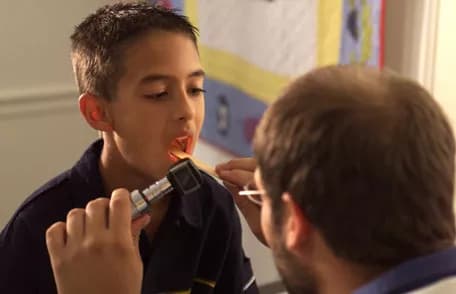
Incisionless Robotic Surgery Offers Promising Outcomes For Oropharyngeal Cancer Patients
A new study from researchers at Henry Ford Hospital finds an incisionless robotic surgery -- done alone or in conjunction with chemotherapy or radiation -- may offer oropharyngeal cancer patients good outcomes and survival, without significant pain and disfigurement.
Patients with cancers of the base of tongue, tonsils, soft palate and pharynx who underwent TransOral Robotic Surgery, or TORS, as the first line of treatment experienced an average three-year survival from time of diagnosis.
Most notably, the study's preliminary results reveal oropharyngeal cancer patients who are p16 negative -- a marker for the human papilloma virus, or HPV, that affects how well cancer will respond to treatment -- have good outcomes with TORS in combination with radiation and/or chemotherapy.
"For non-surgical patients, several studies have shown that p16 positive throat cancers, or HPV- related throat cancers, have better survival and less recurrence than p16 negative throat cancers," says study lead author Tamer Ghanem, M.D., Ph.D., director of Head and Neck Oncology and Reconstructive Surgery Division in the Department of Otolaryngology-Head & Neck Surgery at Henry Ford Hospital.
"Within our study, patients treated with robotic surgery had excellent results and survival, irrespective of their p16 status."
Study results will be presented Sept. 18 at the 2016 American Academy of Otolaryngology-Head and Neck Surgery (AAO-HNS) annual meeting in San Diego.
Led by Dr. Ghanem, Henry Ford Hospital in Detroit was among the first in the country to perform TORS using the da Vinci® Surgical System. TORS offers patients an option to remove certain head and neck cancer tumors without visible scarring, while preserving speech and the ability to eat.
With TORS, surgeons can access tumors through the mouth using the slender operating arms of the da Vinci, thus not requiring an open skin incision.
Unlike traditional surgical approaches to head and neck cancer that require a large incision and long recovery, TORS patients are able to return to their normal lives only a few days after surgery without significant pain and disfigurement.
For the study, Dr. Ghanem and his colleagues wanted to take a closer look at the effectiveness of TORS for oropharyngeal cancer patients. They reviewed overall three-year survival, cancer control and metastasis, as well as the effect of p16 status on these variables.
The study included 53 Henry Ford oropharyngeal cancer patients who had TORS. Among them, 83 percent were male, 77 percent were Caucasian, and the mean age was 60.8 years. Thirty-seven percent had TORS alone, while more than 11 percent had TORS with radiation therapy, and more than half received chemotherapy and radiation therapy.
Thirty-seven percent had TORS alone, 11.4 percent received radiation therapy, and 50 percent received chemotherapy and radiation therapy. Eighty-one percent of patients had p16+ disease.
The study shows patients with a p16 negative marker had high survival (100 percent) and low cancer recurrence when TORS was the first line of treatment, as well as when TORS was followed by chemotherapy or radiation therapy.
The majority of patients (63 percent) were able to receive a lower dose of radiation after TORS, which reduces the risk of radiation side effects.
While Dr. Ghanem notes the study's results are not enough to change clinical practice, it does demonstrate that TORS alone or in conjunction with adjuvant radiation or chemotherapy is an acceptable treatment option for oropharyngeal cancer patients regardless of p16 status.
Materials provided by Henry Ford Health System. Note: Content may be edited for style and length.
Disclaimer: DoveMed is not responsible for the adapted accuracy of news releases posted to DoveMed by contributing universities and institutions.
Related Articles
Test Your Knowledge
Asked by users
Related Centers
Related Specialties
Related Physicians
Related Procedures
Related Resources
Join DoveHubs
and connect with fellow professionals

0 Comments
Please log in to post a comment.